TENDER TURMOIL
Sanral on a rocky road in wake of billion-rand infrastructure projects awarded to ‘disqualified’ Chinese firms
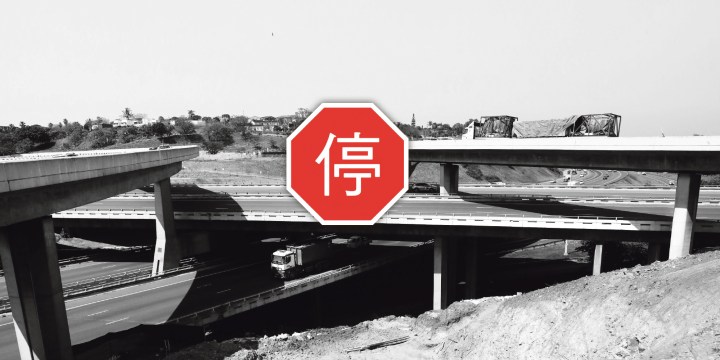
Board members, executives and CEO of state-owned enterprise Sanral launch a passionate defence of bid adjudication process after Chinese companies awarded road and bridge construction project tenders worth billions of rands.
Two of South Africa’s largest road and bridge construction projects were ultimately granted to Chinese companies despite the bidders being disqualified early in the bidding process, tender documents show.
The contracts, granted by the Development Bank of Southern Africa under rules determined by the South African National Roads Agency Limited (Sanral), were for the R4.05-billion Mtentu Bridge contract, South Africa’s largest bridge, and the R4.1-billion EB Cloete Interchange project, the largest road project ever allocated by Sanral.
These infrastructure megaprojects are among government initiatives to strengthen the country’s logistics and transport corridors, grow the economy and create jobs.
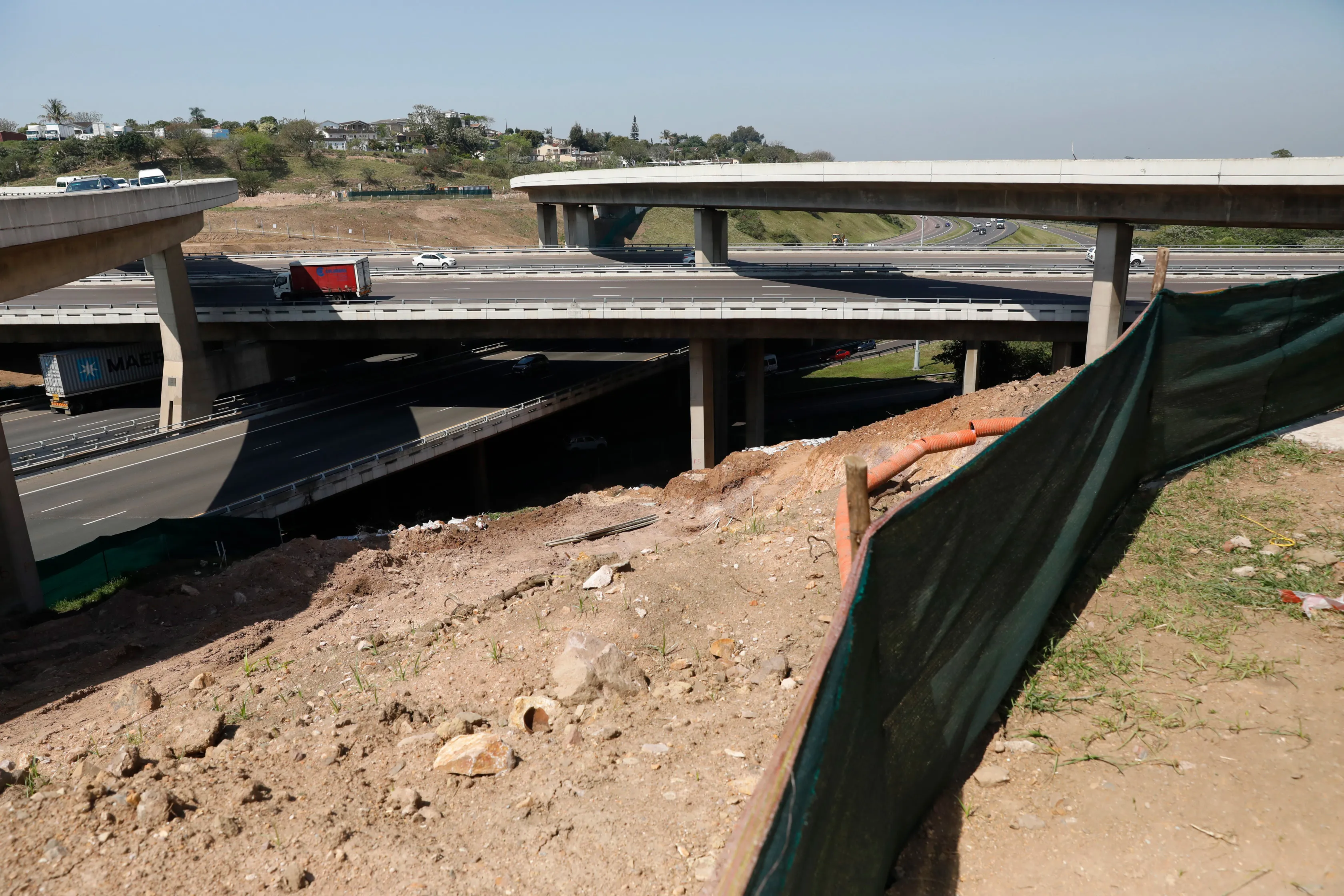
Construction on the N2 interchange in Durban near Westville, KZN, 29 September 2023. (Photo: Mandla Langa)
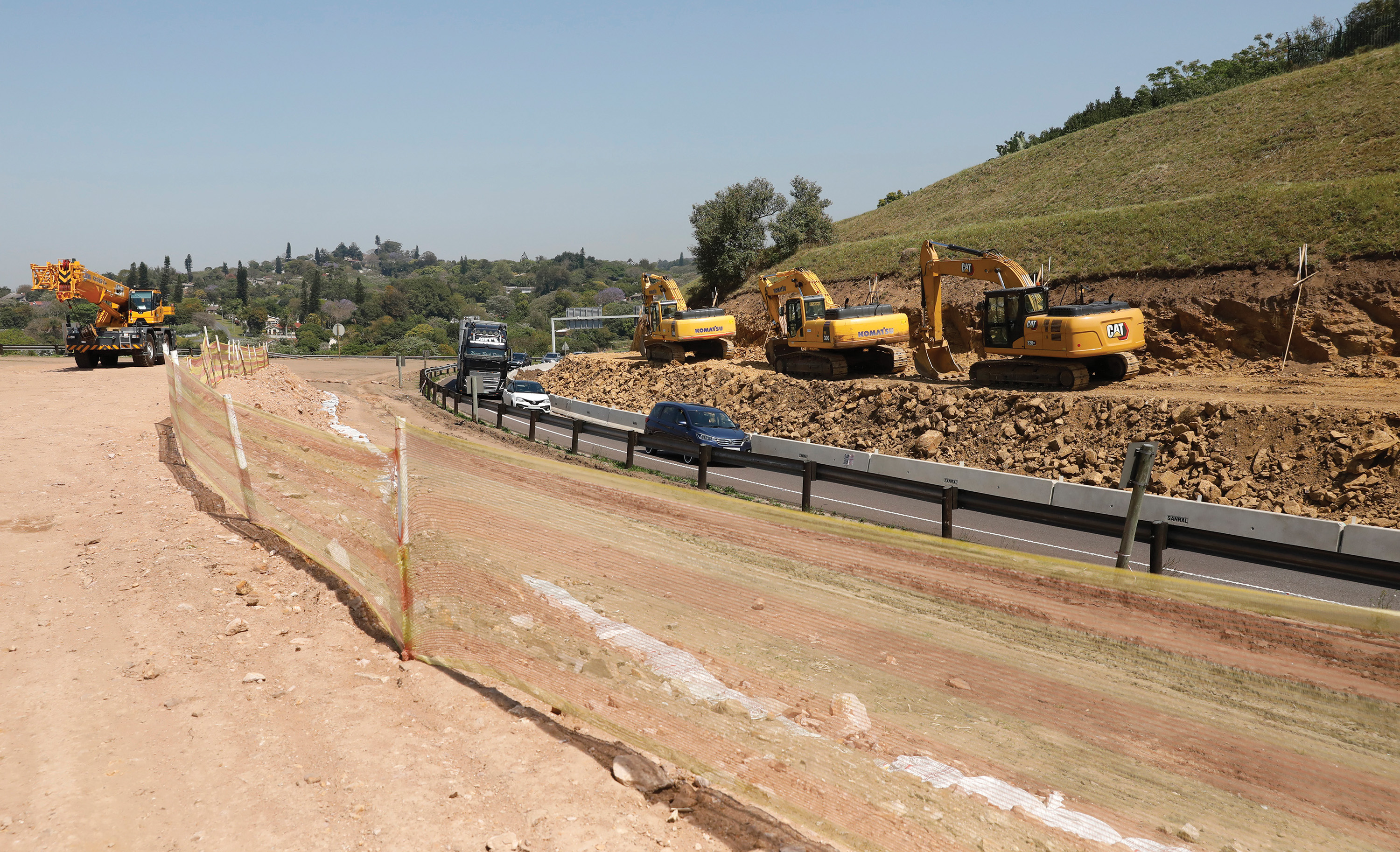
Construction vehicles along the N2 interchange in Durban near Westville, KZN, 29 September 2023. (Photo: Mandla Langa)
The EB Cloete Interchange project will involve the widening of the N2 and N3 national roads in KwaZulu-Natal. The upgrade of the N2 will focus on 55km of road from Lovu River on the south coast to Umdloti on the north coast.
The N3 upgrade will focus on 80km from Durban to Pietermaritzburg. The project will take eight to 10 years to complete.
Once completed by the end of 2027, the Mtentu Bridge will be 1,132m long and form part of Sanral’s N2 Wild Coast Road programme, which involves a 410km stretch from East London to the Mtamvuna River on the border between the Eastern Cape and KwaZulu-Natal.
With the decline of South Africa’s railways, the national road network run by Sanral has become a vital commercial artery.
However, the decision-making and methodology used by Sanral, a state-owned enterprise (SOE), have become increasingly questioned by business and the construction industry, which is already in a parlous state.
In the case of the Mtentu Bridge, tender documents show that neither of the only two applications, the Stefstocks G-LTA Mtentu Joint Venture (JV) and the China Communications Construction Company Mecsa JV, met the eligibility requirements set out by the tender documents.
These requirements are normally assessed early in the process of adjudicating a tender, so it’s worrying that neither of the applicants was considered eligible.
The tender documents show that, on hearing about the disqualification of applicants, “Sanral’s accounting authority sought a legal opinion and resolved that the two bids must be considered as qualifying and therefore be handled as such”.
Sanral’s accounting authority is its chairman, Themba Mhambi. He issued a “formal directive”, which read: “The Accounting Authority of Sanral has noted the recommendation for the disqualification of the two bids for the Mtentu Bridge tender. After, however, considering a legal opinion at its disposal, the Accounting Authority [of Sanral] has resolved that the two bids must be considered as qualifying and therefore be handled as such.
“The relevant committees are therefore directed to proceed with the consideration of the two bids as qualifying”.
On 27 September, Sanral board members and executives, including CEO Reginald Demana, launched a passionate defence of the company’s project approval processes, saying all recently awarded contracts, including the Mtentu Bridge project, were above board.
“They [the contracts] have been run through a rigorous process. It was the board’s prerogative to waive … any process as the accounting authority.
“In the end, there was nothing in the process that was material enough to say the process was fatally flawed and should be cancelled. And those contract awards went ahead,” said Demana during a briefing to journalists.
He said Sanral believes the tender process was run “normally” by the SOE despite neither of the bidders meeting the tender requirements at the evaluation stage, and being chosen after the board’s intervention.
The process in the case of the EB Cloete Interchange was slightly different. The appointed contractors, Base Major together with China State Construction Engineering Company, also did not pass the first round of tender evaluations.
This joint venture, which also won the contract for the Ashburton Interchange on the N3 close to Pietermaritzburg, also did not get through the first round of tender evaluations on this project.
In these cases, the project was readvertised and subsequently granted to the Base Major-China State joint venture. However, according to insiders, the awards were made subject to the provision of documentation.
Intense criticism
The Development Bank of Southern Africa, which had been roped in to oversee Sanral’s tender bidding processes, has been approached for comment but has yet to respond.
In recent months, Sanral has come under intense criticism from the construction industry for how it adjudicates and awards tenders, and for the inclusion of Chinese companies in South Africa’s infrastructure megaprojects.
South Africa’s embattled construction industry is a third of the size it was a decade ago, mainly because of the weak economy and a decline in infrastructure spending by the government and state agencies, including Sanral. Since 2018, Sanral has spent less than half of the grant it receives from the government to embark on infrastructure projects. In 2021/22, it left R10.4-billion of its R15.4-billion budget unspent.
The local construction industry wants Sanral to include it in infrastructure projects.
However, Sanral’s Demana also defended the involvement of Chinese firms in the agency’s contracts. He said such firms are usually experienced and competitive in delivering projects cost-effectively and on time.
“This is not to say that our local contractors are inferior. Some of the local companies have not invested in skills for 20 or 30 years and don’t have expertise in a particular area,” he said.
“Therefore, they tend to bid incorrectly for projects. The costs can come up much higher than a firm that is experienced. Price is often a key determinant in the tenders.”
But what Demana failed to mention is that Chinese firms in some of Sanral’s contracts, including the one involving the Mtentu Bridge, had the advantage of knowing the prices from previous bids, including those submitted by competing bidders based in South Africa, because the projects were being adjudicated for the second time.
The Chinese firms would have had information about the pricing when they moved up the bidding stages and were getting closer to being selected as preferred bidders.
Although they are active in the rest of Africa, Chinese construction firms have not gained a large foothold in South Africa. One of the main reasons is that South Africa has a well-developed construction industry and most local companies have strong empowerment profiles, as many firms are 100% black-owned. This is an imperative when state agencies like Sanral adjudicate tender bids.
Chinese firms often have little to no empowerment credentials. To win contracts from Sanral, they often have to partner with local companies, piggybacking on their empowerment credentials.
Most Sanral contracts, like the ones for the Mtentu Bridge and EB Cloete Interchange, carry a 30% local participation requirement for all bidders. The Chinese firms would have to subcontract some of the project work to local communities and companies (mainly small and medium enterprises).
Although local communities and companies are being brought into the value chain, Chinese companies would still lead the execution of a project.
Even though these mechanisms for the participation of local companies and communities in Sanral contracts have largely been welcomed, the industry is still puzzled by how the agency handed contracts to Chinese firms for the Mtentu Bridge and EB Cloete Interchange projects.
Chris Campbell, the CEO of Consulting Engineers South Africa, an industry body, questioned the fairness of the Sanral tender process that gave a price advantage to the Chinese firms.
“As much as we see ourselves as part of the global village and partnership, it would have been much better had we placed more emphasis on localisation and growing our own local companies,” said Campbell.
Webster Mfebe, the CEO of the South African Forum of Civil Engineering Contractors, was not concerned about the awarding of contracts to Chinese firms, but he hoped that Sanral applied the principles of fairness, competitiveness and transparency during its tender adjudication process, and followed the requirements of the Constitution.
But he was concerned that the principle of fairness and competitiveness may not have been followed, considering that the information about the Mtentu Bridge and EB Cloete Interchange projects, especially pricing in previous bidding rounds, was in the market and known, potentially benefitting the Chinese companies.
Sanral has also ruffled feathers with changes to its Broad-Based Black Economic Empowerment (BBBEE) and a new preferential procurement policy it applies when adjudicating tenders, which major construction firms believe will make it difficult for them to win contracts from the agency.
In the latest development, at least two construction firms, H&I Construction and SMEC South Africa, have obtained interim court orders to stop Sanral’s evaluation of projects using its new preferential procurement policy. Both interim interdicts were granted pending court applications to review and set aside the new policy.
H&I Construction and SMEC South Africa have accused Sanral of not consulting the industry widely on the changes to the policy before implementing them.
Sanral currently has about 200 tenders advertised in the market, with a value of about R33-billion. Sanral has estimated that a third of the issued tenders (with a value of R11-billion) will be affected by the court interdicts, but the roll-out of most of its planned projects will continue.
Controversy about new system
Preferential procurement is the system that paves the way for historically disadvantaged groups and companies to earn extra points in the scoring of tenders, helping them to emerge successful in the bidding process.
In the past, Sanral used a bidder’s BBBEE rating to allocate a maximum of 10 or 20 points out of 100 (depending on the value of the project) for compliance with the agency’s preferential procurement requirements, mainly its empowerment criteria.
Companies with a Level 1 BBBEE rating (the highest and most coveted empowerment status) could automatically receive the full number of points.
In May, Sanral abruptly changed the weighting of the 10 and 20 points for preferential procurement to provide maximum benefit for 100% black-owned firms. Sanral’s changes, argued H&I Construction, would relegate a bidder’s BBBEE rating to a mere 1 point, in the case of a tender valued at more than R50-million, or 2 points when a tender has a value between R30,000 and R50-million.
Essentially, Sanral’s new preferential procurement would render some construction companies unable to compete for contracts.
Despite the court challenges, Sanral is sticking to its new procurement policy. Mhambi, the board chair, said the SOE believes that transformation is a constitutional imperative, and “we will drive it as long as we are the governing structure of Sanral”.
Mhambi said that, despite all the transformation initiatives that Sanral is pushing, the biggest construction companies in South Africa are still the top beneficiaries of its contracts.
“We will continue to support big companies in the construction space, but we will not do that at the expense of the small companies,” he said.
“We will do that within a context that makes use of the big companies to assist the smaller companies to benefit, hence our subcontracting requirements, request for skills transfers to smaller companies, our insistence on the employment of local communities wherever we are doing business and our insistence on progressively increasing the ownership of black people in businesses in South Africa.” DM
This story first appeared in our weekly Daily Maverick 168 newspaper, which is available countrywide for R29.

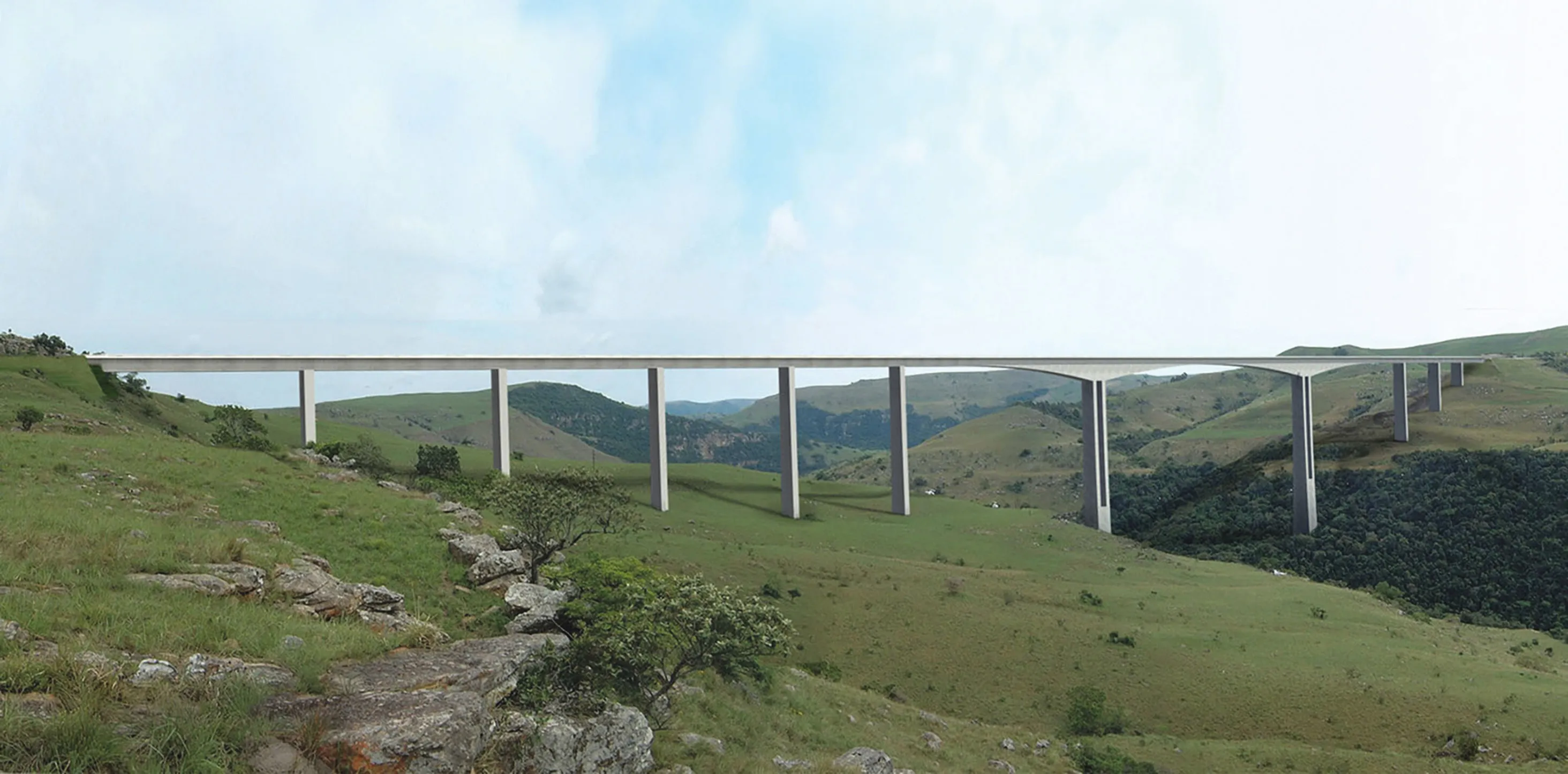
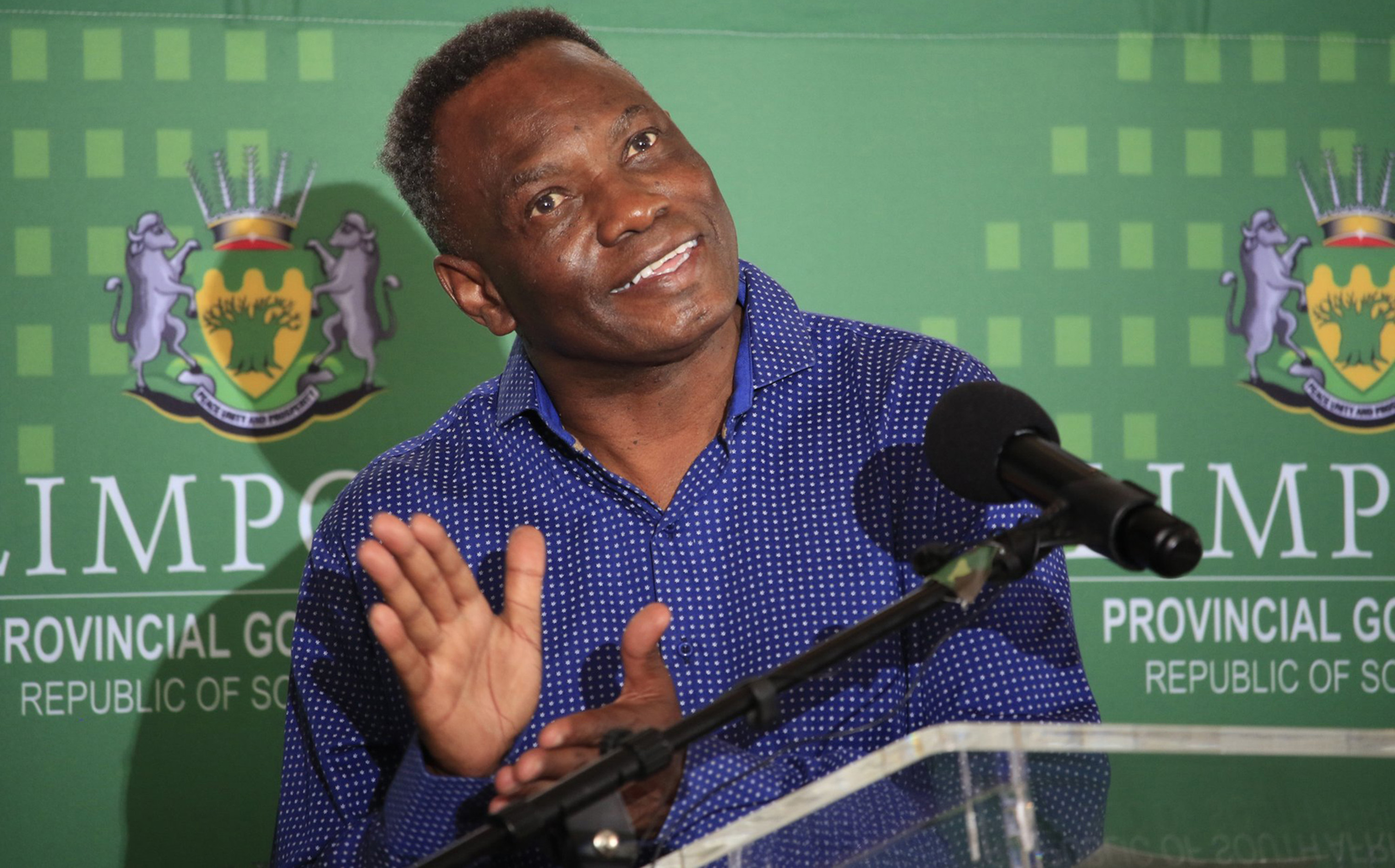
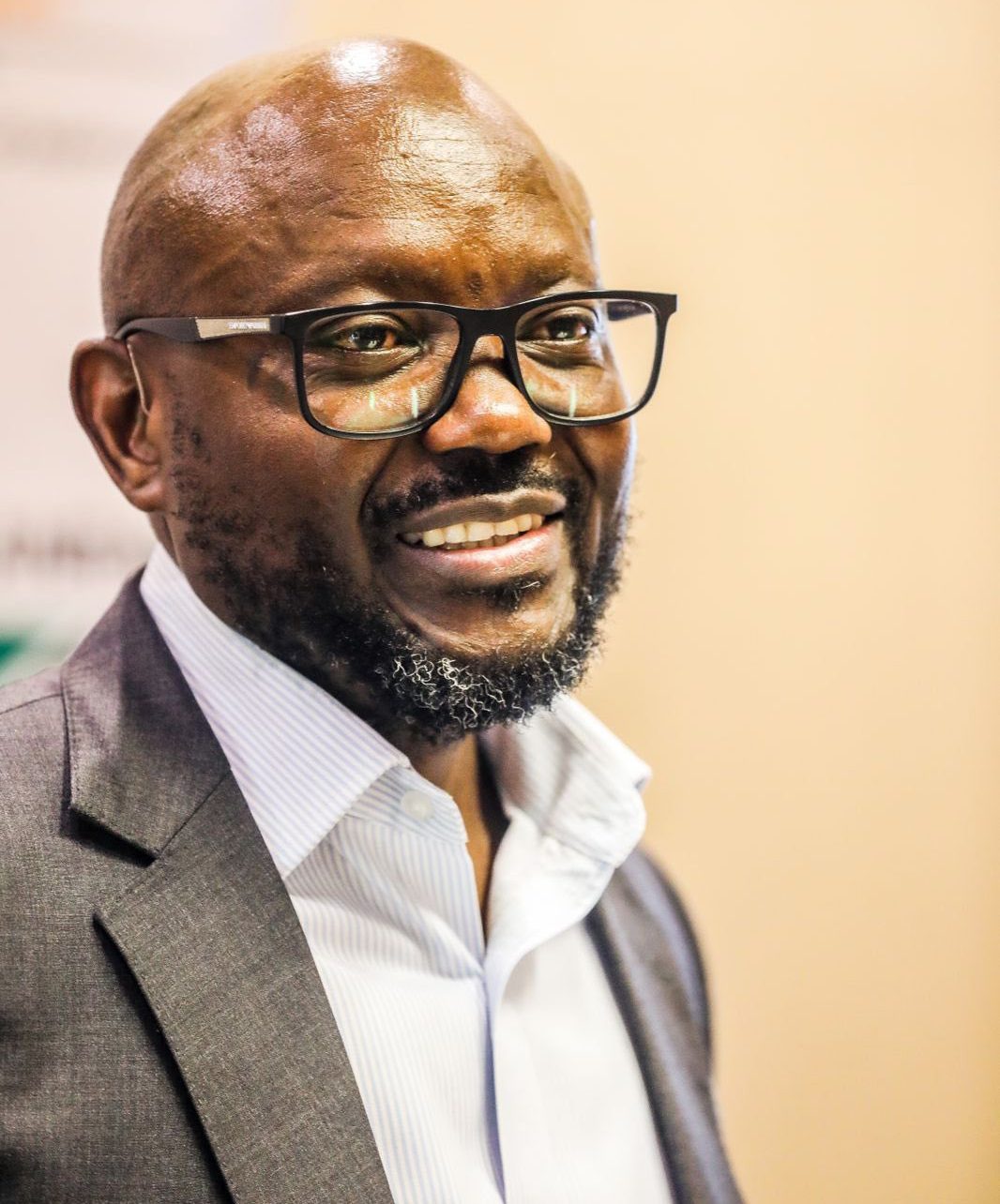

















 Become an Insider
Become an Insider
Anyone taken a look at Mr Mhambi’s bank account?
That may be difficult, because it’s based in China.
Yes, yes, yes, keep the money in SA, but a disciplined approach is essential, and I think that having the Chinese on board will accomplish that. If the timelines and stop work routines of late are any indication of what to expect in such a huge project, then we need to see the outcome from such a partnership.
China is instrumental in many building projects world wide and employing local labour is part of their mandate.
So I reckon we need to watch this project with interest and learn from the experience.
After all, when we look around and see so much that is broken, and the effects the corruption is having on the building industry, this might just be the learning curve that crushes the thugs. I live in hope.
No, no,no…I have traveled Africa extensively and seen the chinese workman ship. Auto- collapsible bridges and self destruct roads. Construction at the speed of light and demise equally so.
” Tofu dregs “is the phrase you seek. First mentioned by an high ranking CCP cadre .
not even real Tofu, just the dregs 🙁
Chinese cannot build roads that last. They build quickly and finish looks good but sub layers are uncompacted and collapse.
Not much African travel, but Addis Ababa a lot.
Venture everything fairly new there is built by Chinese companies.
Boy o boy.
Firstly, everything has a 1970s feel and look about it.
Cheap, nasty, lots of fake and plastic. Not 21century environment conscious…
And scary junctions.
As much as pre-fab as possible, probably made in China and shipped in. Little local adaptions to minimise local Labour or input; obviously, – but then not coping with local conditions, topography, Neighbouring buildings, let alone context.
Every intervention leaves a massive scar, derelict waste land and ripped through townscapes.
I had to live in a Chinese-built hotel; (Chinese characters, instructions (?) in odd places). I got a room on 16th floor, one lift ride made me walk up and down 16 floors for a few days.
Healthy.
That aluminum lift box was sheer terror.
Gaping holes to witness the passing of floor after floor. Horror.
But that’s not what this Sanral madness is about.
That madness is far more horrific than a Chinese elevator.
It’s an ideological vindictiveness and malevolence towards the SA construction industry.
And a business model so clever and opaque, Sanral was totally out of its depth.
I’d take the whole lot on review.
The Chinese seem to have been kicked off the Botswana SSKI Airport – it was not on time or budget and the Morupule Power Station – that broke down and handed over to a German company. What is clear is that the only thing China does well is play the corruption game!
Yeah, no. The Chinese are famous for cheap and bad workmanship. Absolutely the last thing you want in a bridge or a road.
No, Chinese companies import everything for these projects, including food, labour, materials etc they use nothing local and give nothing to the communities they work in
They don’t use local labour. They ship their own in. That’s why they don’t have work stoppages.
And let us please not forget the CRRC Corp train debacle where they provided the wrong specifications on 1064 locomotives, the Gupta involvement and retaliations from the Chinese because Transnet wanted to pull out of the deal. Sanral management has a short memory or very deep pockets.
In the interest of fairness I trust South African Engineers and Construction Contractors are permitted to bid for and secure contracts in China and other BRICS countries?
I assume you were pointing out the hypocrisy and didn’t mean that as a serious question?
So we need to follow Zondo and look for Front companies of nil experience owned by friends and families for local component. Plus kickbacks for leveraging the deal? A Passionate defence of the indefensible suggests someone has a personal stake in the tender. Here we go again..
South African companies can (could) build any road project that could be thrown at them. Every time a Chinese company gets a road job, South African workers lose jobs and expertise.
Keep Chinese colonists OUT!
Local construction companies lack the expertise and yet billion in contracts are awarded to underqualified BBBEE companies every year. The cadres really are a stage 5 terminal cancer for SA …
Local construction companies lack expertise BECAUSE of BEE, all the skills have left the country
What about the thousands of “unqualified” previously disadvantaged contractors that don’t finish their contacts and run away after they have eaten all or part of the money.
Look at the the state of some of the roads in the Free State, some repaired and already full of potholes, some left as gravel roads for kilometers on end.
Money well spent you think?
“left as gravel roads” – you should refer to these as “previously tarred roads”. It all boils down to ComRAIDS feeding themselves.
In the time leading up to award of these major Contracts, the question on everyone’s lips was how can we give all this construction work to Chinese Companies, on the rebound, from a suspect retender, where all the original prices are known? What I remember just before the award was Cyril on TV saying the Transnet Rail Spares had been resolved, leading to a softening of anti-Chinese sentiment brought about by the remnants of State Capture from Zondo era and still not resolved now after many more promises on convenient occasions and visits to China and BRICS conference. How is China rewarded with major Contracts when the economy of South Africa has been drastically damaged by State Capture 1.0.
India built 75km in 5 days. Why do they need 8-10 years?
Not saying that getting Chinese companies involved in construction is good or bad, but is everyone forgetting how the local SA construction firms engaged in massive corruption and illegally ripped the absolute ring out of taxpayers when they built the 2010 Stadiums and upgraded the Gauteng freeways?
That was stupid of them, but I’d venture it was all overblown by our dear HE Minister Patel for reasons of extortion.
The preparation of the bidding was excessive, costing hundreds of million of Rand for bidding companies – and it was here were (i believe) the collision took place.
In the end, basically a rounding error what the costs were.
But the ANC made a meal of it. For whatever reasons…
Best to read up more about it before we get out the tar and feathers.
No pressure from the top guy then 🙂
Xi is his big buddy .
Just where will all the Chinese workers live for the +- 10 years for completion of projects ?
Will need housing , Chinese supermarkets and local police .
Maybe wives and family come over , need schools etc:-)
How will all the visas work ?
Yes , amazing bridges , at what cost , the architect just designs with little thought to cost , they get paid regardless 🙂
All this along with the viability of this route and supposed spin offs 🙂
Ala the “arms deal ‘ 🙂
This is after all ‘ the peoples money ‘ .
So , initial cost for 1 bridge R4 billion ! Divide that by 55 million .
And we still have pit toilets !
Maybe the Chinese can fix those too , given the state of the economy in China , now exporting workers !
As for the quality 🙂
Even the CCP complain about ‘ Tofu dreg ‘ construction ,not even real Tofu , just the dregs left over !
Wonder what it would cost to get ‘Transnet’ functional ?
We have steel for rails and concrete for sleepers .
The chinese build their own labour camps on site at these projects, they stay in the camps, everything the need is imported including food etc. They have a track record if bringing prison inmates over as labour, there is no family visitation. And when the project os finished, the ex prisoners are left behind to sort themselves out – they’re not allowed back in China
How can there be any mention of the N2 and Mtentu Bridge projects withiut referencing the long term community objections to the entire project and the impact it will have on the Mpondo people and their livelihoods. And of course the link to the mining of the Xolobeni dunes. DM needs to do a much better job of its economic reporting – it’s not just about money, engineering, tenders, audits etc – connect the dots please!
Good points.
Bookmark this day and this article, because WHEN the maggots come crawling out of the rotten case we can all go “See? Told you so.” Whenever a CEO of an SOE (that’s historically been mired in scandal & corruption) says that everything is fine, we can be certain that everything is indeed NOT fine.
And yet another SOE where we can take for granted that nothing is as it should be, that all key people have hands in the till, that lip-service is paid to principles, that the product will be shoddy, (a la Kusile) and that those most in need will remain that way. China? Why – really why – not the sanitised double speak. When we hear how the local construction industry is being decimated, what the actual hell? (Polite version)
It appears that unfortunately the provision of national roads is becoming political.
For decades national roads have been provided by competent engineers without any political involvement – hence our world class system of national roads. But the current board, with no significant engineering experience in its makeup have come up with strange thoughts on the letting of contracts, which were never a problem in the past many decades. Both the major Chinese and South African contractors are competent and world class, so why were the tenders re-advertised in the first place – politics? Also the SANRAL engineers have always been sound with no hint of misdemeanors for decades. I say this as a previous Head of National Roads in the country and also a member of the executive committee of the World Road Authority, the premier body for world road authorities
Thanks for your comment as someone who knows the terrain.
I’ve no clue, but sense a vindictiveness and malevolence against SA construction companies.
Reason is why…?
Just makes no sense.
But when long serving and highly regarded specialist employees leave when an unqualified new head spins the crazy wheel, … then there is reason to worry.
Surely the strings of “no-string-attached” Chinese loans, do become visible eventually. Countries rely on hanging on these strings and they have formed nooses around too many necks. We need to admit that China’s strategy to control the leaders and the functioning of inferior countries was successful and they’re the boss now.
The SILK road never ran through South Africa years gone by – perhaps this is a new road for China to pave its way into South Africa, just like it is happening all over in Africa – in Ethiopia, Angola, Namibia to name but a few. Build roads and railways to bring in cheap Chinese products and at the same time destroy local industries. We definitely do not need Chinese road building expertise. Its an affront on the South African construction industry which is already in a downward spiral. South African companies cannot compete with Chinese state owned companies that are heavily subsidised by the Chinese state government. It smells on another rotten red herring!!!
I am given to understand that the professional staff at SANRAL are not happy with their Board’s decision. I an concerned at a possible exodus of competent staff, much like the Eskom and Transnet example – then we will really be in trouble in being able to move around the country efficiently. Witness the parlous state of provincial roads
As I said a few weeks ago, Africa is being slowly colonised by China.
This looks suspiciously like Cadre State Capture again. Disqualified should mean exactly that.
The current gravy train has some challenges. No power at Eskom and the Transnet has literally come of the rails with the Chinese locos all broken down or spares sold for scrap. But the elections are coming and the ANC needs money. SANRAL is the savior. Expect the project cost to double, the implementation time to double, new chapters for Zondo and no prosecutions. What rules? Who in the ANC has ever been fired for breaking rules. Many were rewarded with promotions.
Didn’t Squirrel want us to “Buy South African”?🤔
There is a very simple explanation. These guys expect the ANC to be out of power by next year and still want to use the opportunity to make hay as long as the sun shines.
Good, and highly worrying observation.
Criminal incompetence and theft again!
Thieves. The whole lot of them.
Yes, sure. Make sure your pals score and you get millions. Here is the next Eskom in the making. Another “Koko” with a chairman (as in Dudu) out of his depth and trying to win favours with the ANC. Completing their mandate is the very last item on the agenda. “Eating” and “let caders eat” are the top priority and then keep the masses satisfied because the middle finger was waived at corporate SA and of “minority whites”.
Information from an engineer that worked on the Coega Harbour project:
A lot of work was contracted out to Chinese contractors. On commencement, a Chinese ship was anchored outside the harbour loaded with workers who were taken to and from work every day by boat. So no local workers were used on these contracts. They never left the ship if they were not working. The interesting thing about this was that the vast majority of Chinese workers were actaully convicts who had been offered a deal: time off their sentences for working on the project. I don’t think they were paid. Slave labour? This is one of the reasons that the Chinese are often so cheap. I think this may also explain the poor quality of workmanship on Chinese projects.
Is a similar thing going to happen for the SANRAL projects?
This is extremely concerning. Apart from the concerns mentioned in other comments below, and the possibility of money passing hands outside the realms of what can be concerned ethical to gain these concessions, there is every chance that there are geopolitical ambitions behind these deals. It would be worth investigating who has the ultimate control over the companies concerned: the Chinese Communist Party, the Chinese military (yes, as part of their hybrid warfare strategy) or individuals connecting with the CCP.
Is it confirmed or not that the financing of these bridge contracts is from the Treasury?